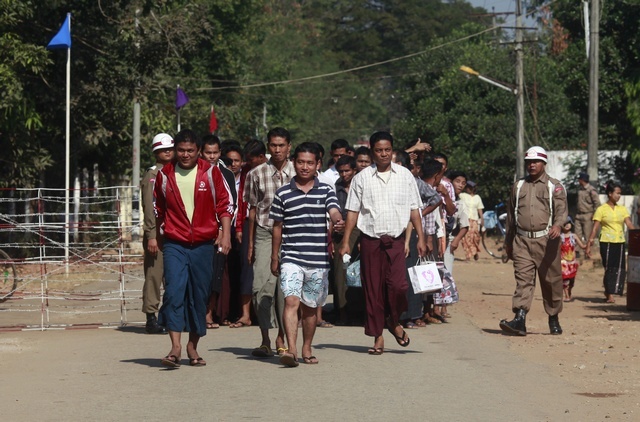In an announcement published in The New Light of Myanmar today, President Thein Sein’s office ordered the formation of a commission to “grant liberty to remaining political prisoners”.
The committee has been tasked to review existing cases and determine how many political prisoners remain in Burma, according to the report.
“The Union government has been granting amnesty to prisoners of conscience serving their terms in prisons across the nation, with a view to ensuring peace and stability and lasting peace of the State [and] national reconciliation,” read the bulletin in the state mouthpiece.
“The President’s Office has today instructed the formation of a committee to scrutinise the remaining political prisoners serving their terms in prisons throughout the country so as to grant them liberty.”
Thursday’s announcement is the first time the current government has officially acknowledged the incarceration of political prisoners in the country.
“That the Office of the President used the term political prisoner is a significant step, but there is still a long way to go,” said Aung Myo Thein from Assistant Association for Political Prisoners – Burma (AAPP-B).
“A verification committee can only be successful if the government officially recognises all those detained under politically motivated arrests, not just those sentenced under traditional political laws and acts like the Unlawful Associations Act or Emergency Provisions Act.”
The AAPP-B spokesperson said they were unaware of what criteria the government would be using to define political prisoners.
“If the government is serious about releasing political prisoners in the spirit of genuine national reconciliation, they must include all those who have been persecuted and arrested due to the government’s repressive laws,” said Aung Myo Thein.
According to AAPP-B, there are still 222 political prisoners in Burma.
Beginning in January last year, Thein Sein’s government has been sporadically releasing political prisoners.
However, analysts have criticised the government’s continued use of amnesties as bargaining chips with the international community, most famously with the release of prisoners that coincided with President Obama’s trip to Rangoon visit last November.
“Certainly we’re very interested to see what the composition of this review mechanism will be,” said Phil Robertson, deputy Asia director for Human Rights Watch.
“There were promises made by President Thein Sein to President Obama just before [his] arrival in Burma [to look into] the issue of political prisoners. This has been a key critical stumbling block with human rights issues in Burma.”
Robertson said the participation of civil society organisations would be vital to the commission’s success.
“Now, we’re hoping this is going to be the front end of a meaningful process that will involve civil society groups – both as informants and monitors and committee members because many of these groups have been active in compiling information about political prisoners for quite some time,” said Robertson.
President’s Office Minister Soe Thane will chair the commission, which will include representatives from government ministries, civil society organisations and political parties.



